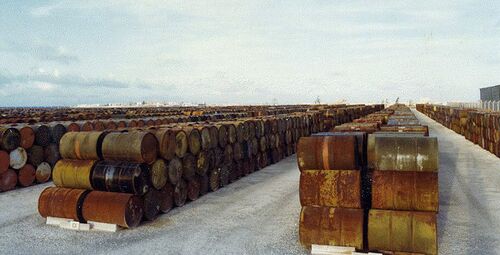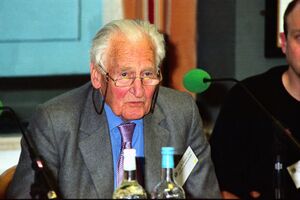Agent Orange
(defoliant, herbicide, chemical weapon, carcinogen) | |
|---|---|
 | |
| Interest of | Richard Doll |
Agent Orange is one of the defoliants in a group of defoliants that was used heavily in Vietnam in Operation Ranch Hand from 1961 to 1971. It continues to cause damage to the people and environment of Vietnam to this day, and the effects look likely to last for generations to come. It is a combination of 2,4-D and 2,4,5-T, variations of it where all given colour codes and they became known as "Rainbow Herbicides", each with different chemical constituencies. Agent Orange being the most heavily used of the group and was used from 1965 to 1970. Close to 20,000,000 gallons of Rainbow Herbicides were used, with Agent Orange claiming approximately 12,000,000 gallons.
Medical experts
“For really almost 40 years, there has been a studious, concerted, planned effort to keep any study from being done and to discredit any study that has been done.”
Jeanne M. Stellman (2016) [1]
Richard Doll
While he was being paid $1,500 a day for twenty years in consultancy fees by Monsanto (a lot of money back then), a total of eleven million dollars, British epidemiologist Sir Richard Doll wrote to a royal Australian commission investigating the potential cancer-causing properties of Agent Orange. Sir Richard said there was no evidence that the chemical caused cancer.[2]
Vernon Houk
Dr. Vernon Houk was Director of the Center for Environmental Health at the Centers for Disease Control, and also Assistant US Surgeon General under both presidents Reagan and George H.W. Bush.[3] Henry Vinson , who ran the biggest gay escort service in Washington DC, wrote:
“Dr. Vernon Houk quickly comes to mind when I think of a patron of my escort service who may have fallen prey to blackmail. Houk was Director of the Center for Environmental Health at the Centers for Disease Control, and also as the Assistant Surgeon General under both presidents Reagan and George H.W. Bush. Although Houk lived in Atlanta...he was fond of holing up D.C. hotels with multiple bottles of booze and several escorts over the course of a weekend, and [likely CIA operative] Tony was also fully cognizant of the eminent doctor's bacchanal laced sprees.
In the 1980s, Congress tasked Houk with overseeing a study on the toxic effects of Agent Orange on Vietnam veterans, who had been subjected to the carcinogenic chemical en masse. Houk, however, declared that the soldiers' records made it impossible to discern the extent of Vietnam veterans who were subjected to Agent Orange, and he put the kibosh on the study. But a former chief of Naval Operations, who was the Navy's top commander in Vietnam, told a House subcommittee that Houk "made it his mission to manipulate and prevent the true facts from being determined" in his quest to cover up the true carnage spawned by Agent Orange. If Houk had proceeded with the Agent Orange study, the Pentagon undoubtedly would've been liable for astronomical, class action lawsuits.”
Henry Vinson (2015) [4]
Alvin Young
One of the experts most active in US government campaigns to downplay the connection between military herbicides and health damage has been Dr. Alvin Young, a former USAF scientist, nicknamed "Dr. Orange"[5]. Since the 1970s, Young has published a series of reports denying that Agent Orange and other defoliants harmed those exposed.
Young has stonewalled for decades. According to him, few veterans were exposed to Agent Orange, which contained the toxic chemical dioxin. And even if they were, it was in doses too small to harm them. Some vets, he wrote in a 2011 email, were simply "freeloaders," making up ailments to cash in on the Veteran Affairs' compensation system.[6] Young's defense relied heavily on his previous work, some of which was funded by Monsanto. and Dow Chemical, the makers of Agent Orange. Young also was as an expert for the chemical companies in 2004 when Vietnam vets sued them.[5]
References
- ↑ https://www.propublica.org/article/alvin-young-agent-orange-va-military-benefits
- ↑ https://www.theguardian.com/science/2006/dec/08/smoking.frontpagenews
- ↑ https://www.nytimes.com/1994/09/13/obituaries/vernon-houk-crucial-figure-in-dioxin-issue-is-dead-at-64.html
- ↑ Henry Vinson, Confessions of a DC Madam, page 201-202
- ↑ a b http://www.propublica.org/documents/item/3143967-Alvin-Young-Affidavit.htmlhttp://www.propublica.org/documents/item/3143967-Alvin-Young-Affidavit.html
- ↑ https://www.researchgate.net/publication/8125485_Assessment_of_potential_exposure_to_Agent_Orange_and_its_associated_TCDD?
